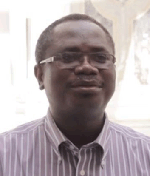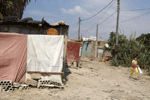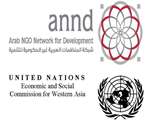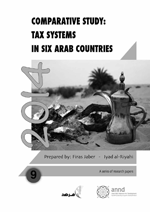Lebanon
Published on Thu, 2015-05-07 19:33
In the eve of an official regional forum on sustainable development, the Arab citizen organizations proposed alternative strategies. The NGO Network for Development (ANND), in collaboration with the Economic and Social Commission for Western Asia (ESCWA) and with the participation of the Civil Society Division in the League of Arab States, spelled out policy alternatives and submitted them to the governments. Read here the "Alternative Development Strategies for Post-2015: Exit from the Current Policy Approach".
|
Published on Mon, 2015-02-09 11:16

Photo: ANND.
|
The Arab NGO Network for Development (ANND) organized, in cooperation with the CSO Partnership for Development Effectiveness, a sub-regional workshop held in Beirut, Lebanon on January 24 and 25, 2015 for the Levant states. This workshop, aimed to assess and determine the mechanisms and prospects of accountability for the various parties involved in development, be they governments, donors, civil society organizations or the newcomer, i.e. the private sector. Sessions focused on two issues, accountability and the civil society working.
The workshop was attended by representatives of organizations from Lebanon, Syria, Jordan, Bahrain, Iraq and Palestine.
|
Published on Tue, 2014-12-23 09:28
For the fourth successive year, a delegation of human rights and development civil society organizations from the Arab region will be visiting the European institutions in Brussels between the 8th and the 12th of December 2014. The Arab delegation includes civil society representatives from Egypt, Jordan, Palestine, Morocco, Syria, Tunisia and Lebanon.
This visit seeks to provide a platform for dialogue and exchange between civil society organizations from the Arab region and European policy makers at the Parliament and Commission around the EU’s support and involvement in the region.
|
Published on Fri, 2014-11-21 12:35
The Arab NGO Network for Development (ANND), in collaboration with Christian Aid and Social and Economics Policy Monitor Palestine, explore in their comparative study on “Tax Systems in Six Arab Countries” how the tax systems of Arab countries have contributed to the lack of opportunity, growing inequalities, marginalization and exclusion suffered by the majority of people living in the Arab region. The revolutions witnessed by some countries in the region and the instability and crises in others are in part a demonstration of the people’s rejection of these inherent structural disparities. Paradoxically, as the report shows, it is the tax policies of these countries that present one of the key means by which local resources could be redistributed and mobilized to restore socio-economic justice to the poor and to foster more self-reliant development.
|
Published on Thu, 2014-06-12 21:46
The Arab NGO Network for Development (ANND) hosted the European Investment Bank (EIB) Vice President, Mr. Philippe de Fontaine Vive along with a team of EIB staff and representatives of the EU delegation to Lebanon on June 10th. The meeting brought together representatives of Lebanese Civil Society and international organizations working in Lebanon. ANND's work and monitoring of the EIB's involvement in the region prompted such a meeting.
Since 2005, we could see a change in the EIB policies, which has chosen as interlocutor private local banks with three different measures. The first one enters in the micro-credit process to "facilitate households' access to credit", the second one consists in the implementation of private investment funds for the SMEs and the last one consists to negotiate directly with the local private banks on projects to finance SMEs from specific sectors.
|
Published on Thu, 2014-05-15 09:21

Gustave Assah.
|
The participants in the civil society strategy meeting on monitoring and accountability organized by Social Watch last february in Montevideo were asked about how they personally work and relate with the huge task of making the powerful accountable. Here is what they said:
|
Published on Thu, 2013-10-10 14:29

Photo: UNHCR/S. Malkawi
|
One cannot discuss policy priorities and challenges in Lebanon without first addressing the dangerous developments the region is currently experiencing. Oppression, backwardness and the shortcomings of democracy in the region as a whole are serious hindrances that could turn the tide and reverse the more positive trends. Despite the challenges they raise, the current developments clearly demonstrate the potential for change in the region: people are no longer willing to stand idle in the face of tyranny, poverty, unemployment and marginalization.
Lebanon is still facing the systemic challenges of the political confessional system. The state must be an institutional and constitutional expression of democracy and people’s rights. Genuine citizenship cannot be achieved without the rule of law, without a system that gives citizens their rights and duties towards both society and the state, which are also preconditions for an effective civil society. Thus the main obstacle to true citizenship in the country is still the partition of state offices and institutions among the different religious confessions.
|
|
One cannot discuss policy priorities and challenges in Lebanon without first addressing the dangerous developments the region is currently experiencing. Oppression, backwardness and the shortcomings of democracy in the region as a whole are serious hindrances that could turn the tide and reverse the more positive trends. Despite the challenges they raise, the current developments clearly demonstrate the potential for change in the region: people are no longer willing to stand idle in the face of tyranny, poverty, unemployment and marginalization.
Lebanon is still facing the systemic challenges of the political confessional system. The state must be an institutional and constitutional expression of democracy and people’s rights. Genuine citizenship cannot be achieved without the rule of law, without a system that gives citizens their rights and duties towards both society and the state, which are also preconditions for an effective civil society. Thus the main obstacle to true citizenship in the country is still the partition of state offices and institutions among the different religious confessions.
|
Published on Mon, 2013-09-02 09:16
The political stalemate continues in Egypt; the dismissal of the Rabeaa and Al‐Nahda sit‐ins was one of its bloodiest events. Although many players are keen to protect the Egyptian state, safeguard its persistence and support its role, efforts are still required on all fronts, including the international front, to reach effective and permanent solutions s that respect human rights and allow for a resumption of the transitional political process. This process includes promulgating a new constitution that meets the aspirations of all Egyptians s of all factions and affiliations and making conditions suitable for holding fair, democratic and unchallengeable elections. This will guarantee the right of Egyptian men and women to decide a future for them and for their representative institutions. The Arab NGO Network for Development (ANND), Beirut released a statement on August 27, 2013.
|
Published on Thu, 2012-03-15 11:39
In terms of gender equity Lebanon is above the Middle East and North African average, and also above neighbouring Syria, although in worst situation than Israel, which bares the best score in the region.
|
SUSCRIBE TO OUR NEWSLETTER
Submit

|









